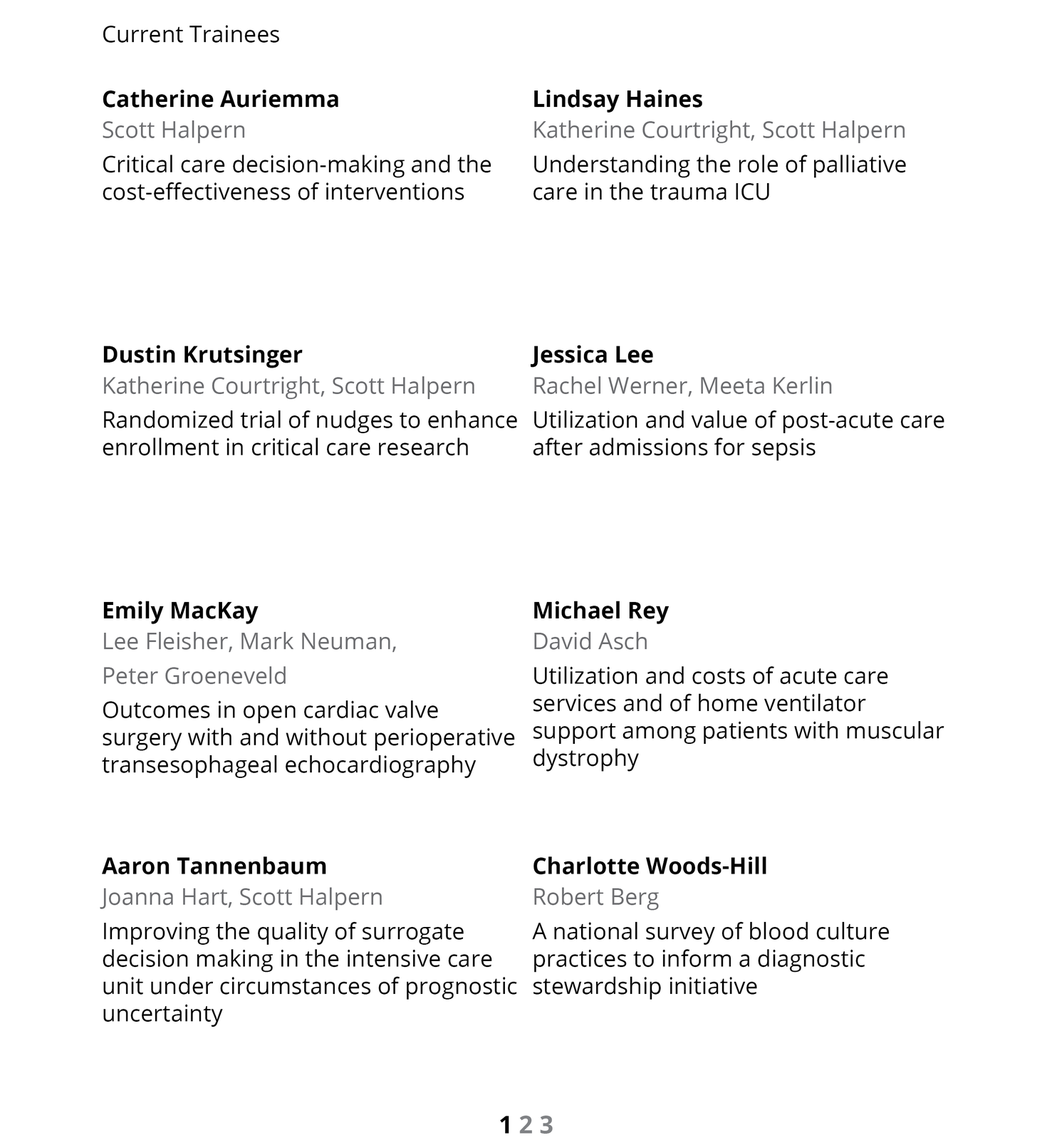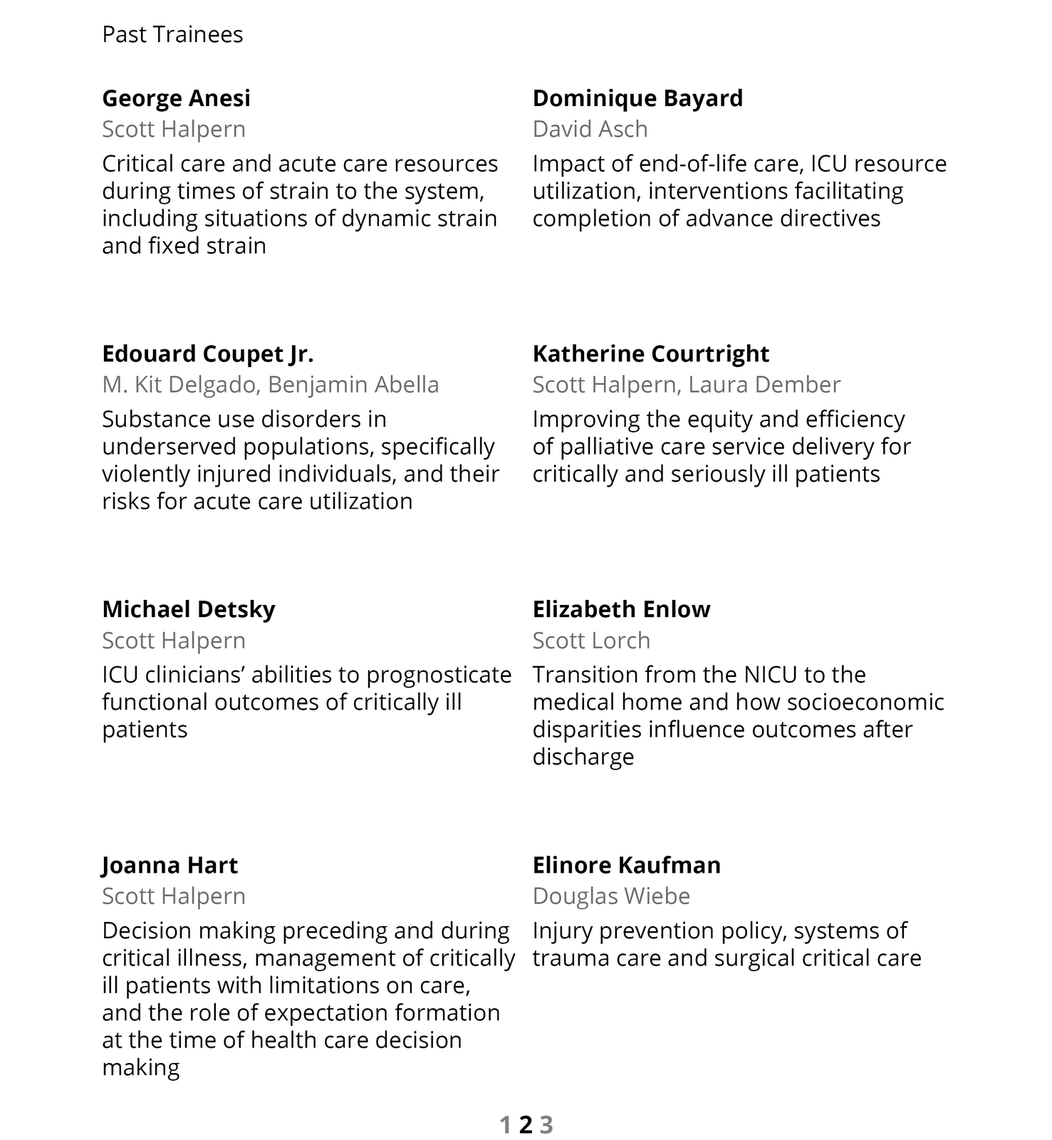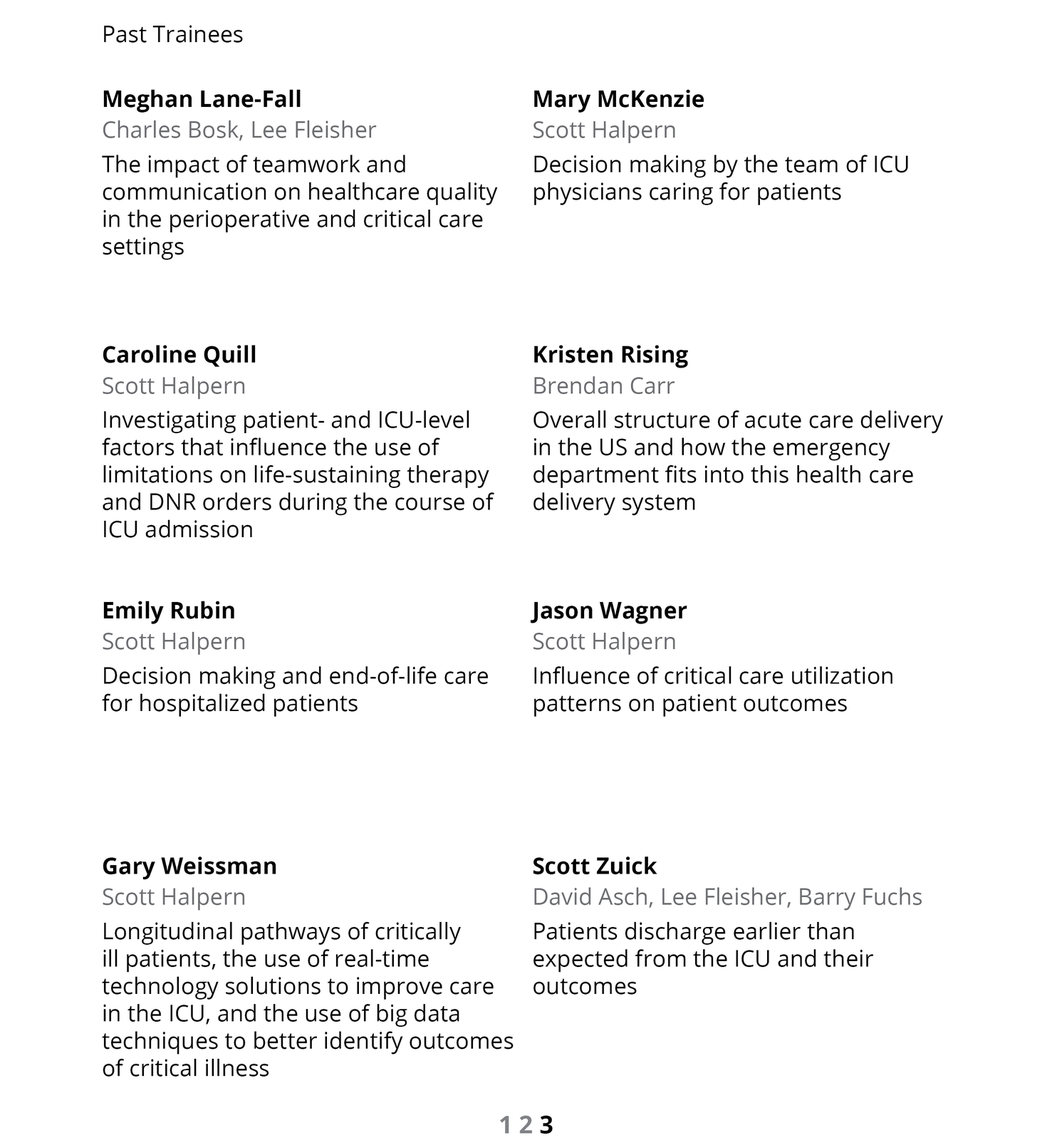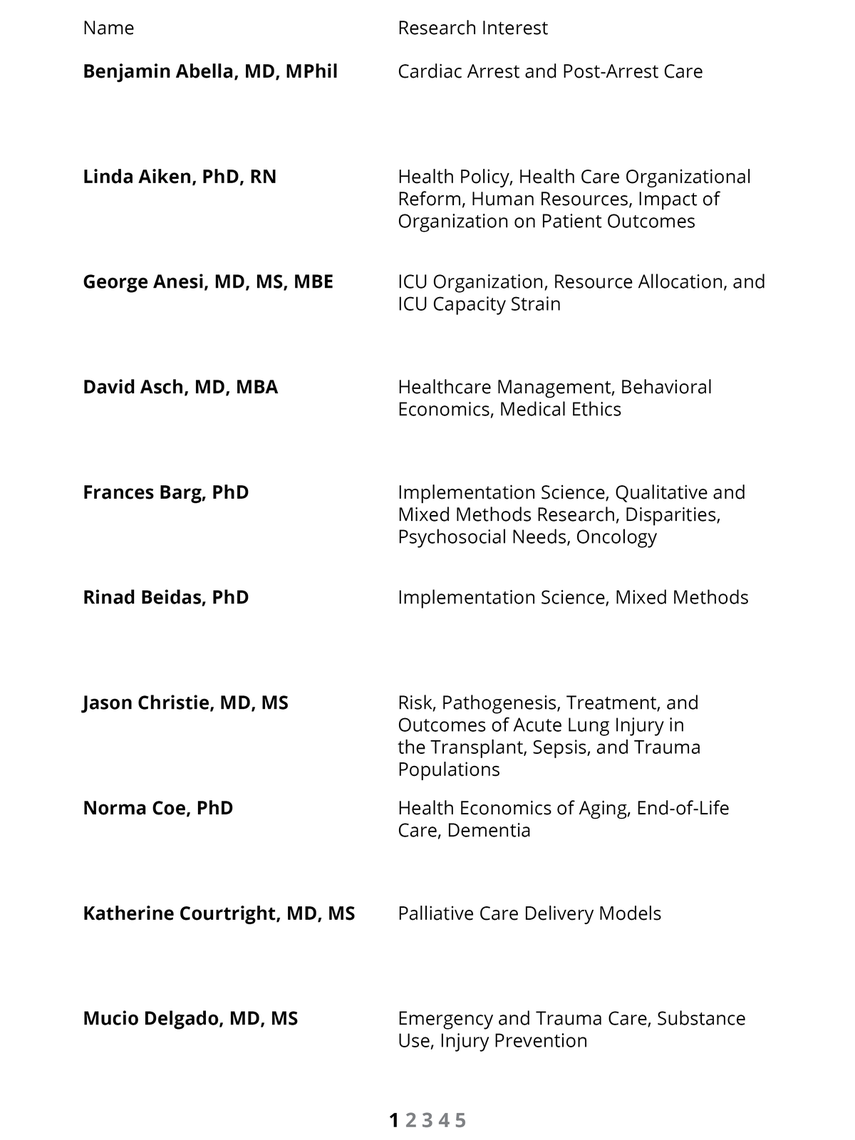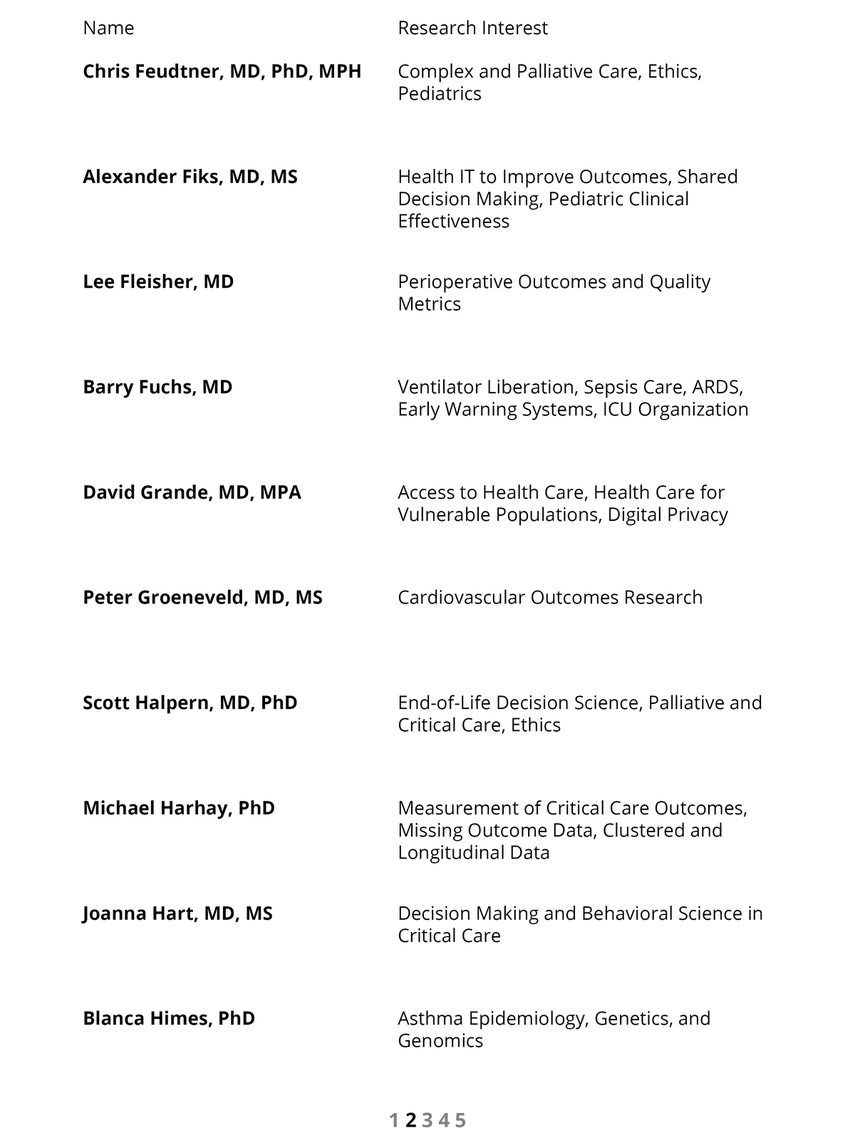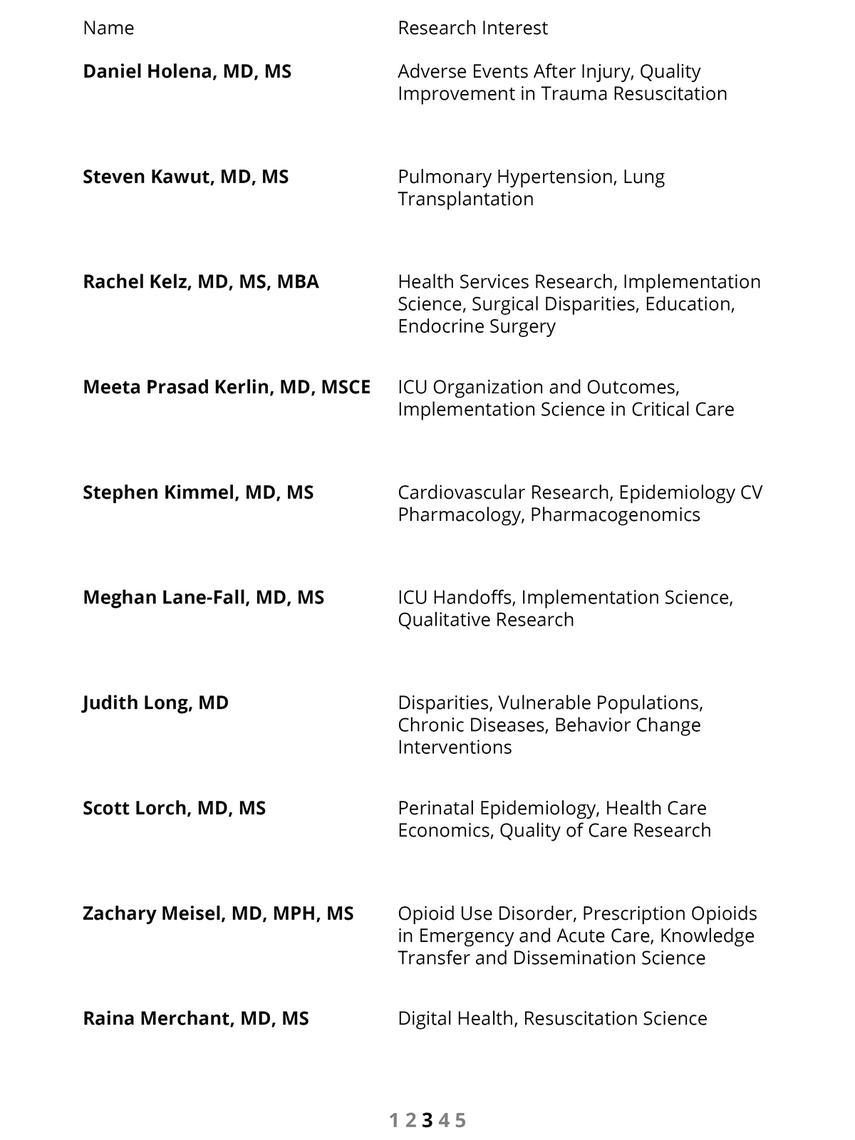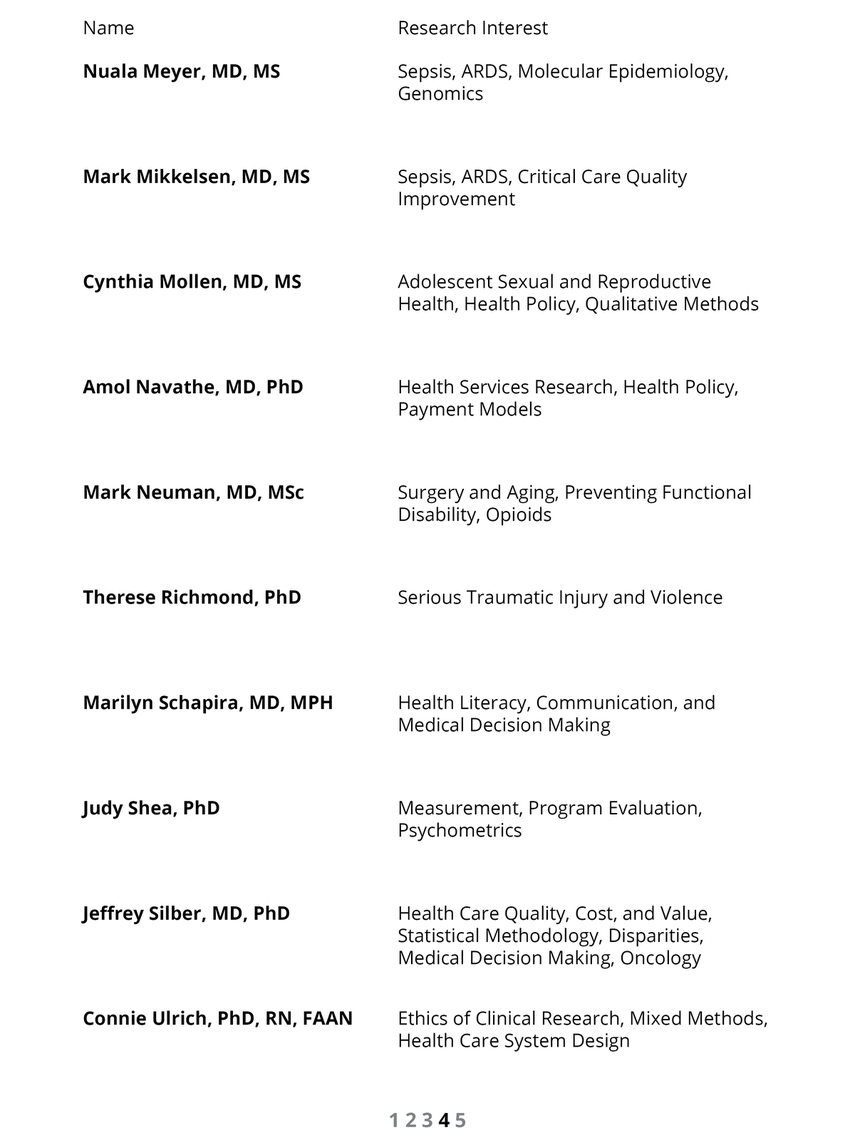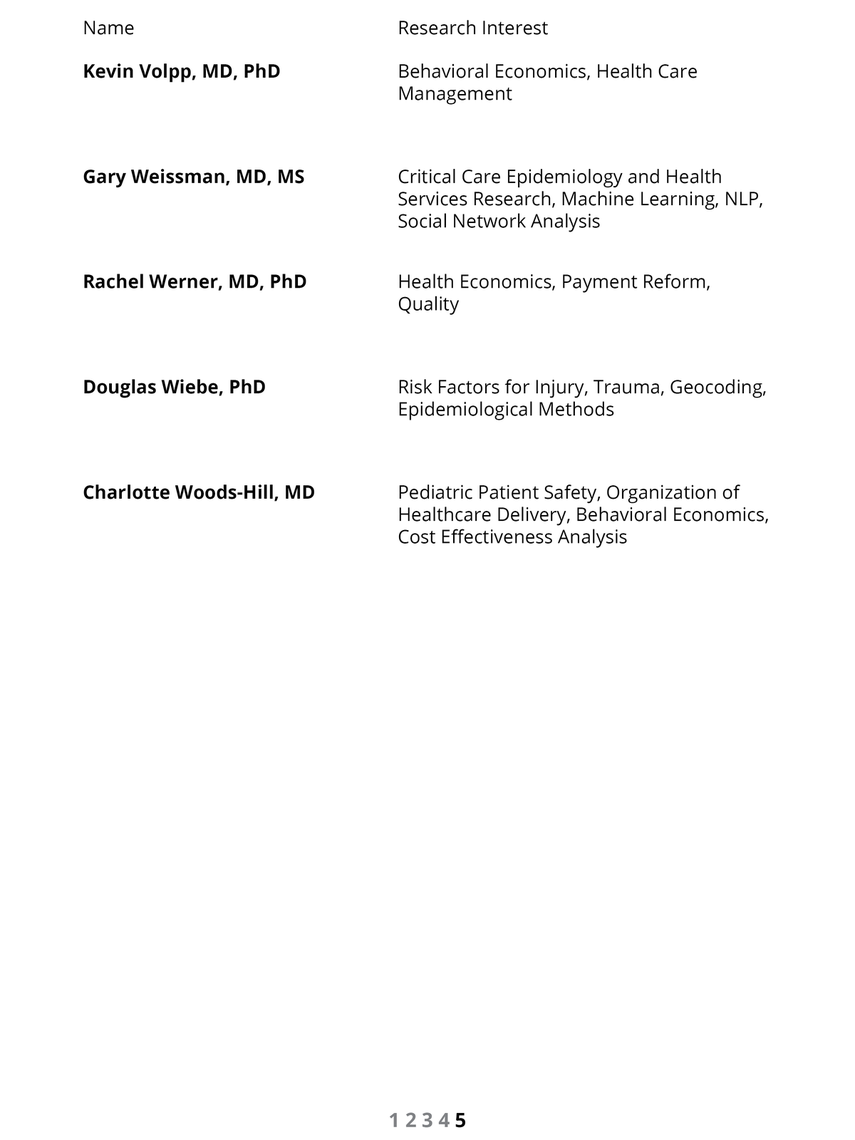
Postdoctoral Training Grant in Critical Care Health Policy Research
Table of Contents
NIH-funded training grant T32HL098054 has supported postdoctoral training in critical care research at Penn for 10 years. The program is designed for postdoctoral physician fellows with clinical experience in adult and pediatric critical care. The overall goal of this Critical Care Health Policy Research (CCHPR) program is to train and develop independent investigators who conduct impactful, policy-relevant health services research that improves the quality of critical care medicine, including its safety, efficiency, equity, and costs.
The training grant is led by:
Scott D. Halpern, MD, PhD
Program Director
Professor of Medicine, Epidemiology, and Medical Ethics and Health Policy, and Director of the PAIR Center
David A. Asch, MD, MBA
Director of Mentor-Mentee Relations
John Morgan Professor of Medicine, Health Care Management, and Medical Ethics and Health Policy, and Executive Director of the Center for Health Care Innovation
Lee A. Fleisher, MD
Director of External Outreach and Quality Training
Robert D. Dripps Professor and Chair, Department of Anesthesiology and Critical Care
Eve Higginbotham, MD
Director of Diversity and Inclusion
Vice Dean of Inclusion and Diversity at the Perelman School of Medicine
Meeta Prasad Kerlin, MD, MS
Director of Trainee Recruitment and Selection
Assistant Professor of Medicine and PAIR Center core faculty
CCHPR trainees receive an intensive, structured program of mentoring, didactic research training, and experiential research over two years. Expert faculty across Penn schools of Medicine, Nursing, and Business (Wharton) are available mentors. The program emphasizes research on policy relevant issues in critical care outcomes, financing, delivery, and management, often in contexts that are collaborative and interdisciplinary. Program participants will gain the skills necessary to combine their clinical expertise with their research training in order to ask and answer important questions about how critical care is and ought to be organized, financed, managed, and delivered.
The CCHPR program offers a cohesive training plan consisting of:
> hands-on mentored research throughout the duration of the training program that includes the development and completion of at least one and usually multiple research projects in critical care medicine under close supervision of a multidisciplinary mentoring team;
> core didactic courses in health economics, health policy, methods of data collection, and statistics;
> elective courses in advanced epidemiology, biostatistics, health care economics, implementation science, comparative effectiveness research, qualitative methods, quality measurement, and more;
> participation in multidisciplinary research seminars;
> participation in a professional development seminar series; and
> instruction in the responsible conduct of research and regulatory affairs
The grant supports the stipends of 6 postdoctoral students per year and their tuition costs to pursue a Master of Science in Health Policy Research (MSHP). If individual students have specific training goals better served by one of Penn's other master's programs (e.g., Master of Science in Clinical Epidemiology and the MBA concentration in health care management at Wharton), the leadership team will consider those possibilities on a case-by-case basis.
Click to learn about the Master of Science in Health Policy Research (MSHP) program
Clinical Research Works-in-Progress:
Weekly: Monday, 12-1PM
The Division of Pulmonary, Allergy, and Critical Care provides a forum for faculty and trainees to discuss proposed and ongoing research studies, and for visiting professors to share cutting-edge research in critical care.
Critical Care Case Conference:
Biweekly: Friday, 8-9AM
Fellows from the Division of Pulmonary, Allergy, and Critical Care and the Division of Trauma, Surgical Critical Care, and Emergency Surgery present motivating clinical cases and accompanying evidence-based lectures on topics across the shared spectrum of critical care.
PAIR Center Series:
Six seminars annually: Tuesday, 8-9AM
The PAIR Center Series features eminent clinicians, scholars, and health system and thought leaders at the forefront of advanced illness care. In the 2018-2019 academic year, the Center’s series switched times to align with the UPHS Palliative Care Program’s Grand Rounds.
PAIR Center Works-in-Progress:
Weekly: Tuesday, 2-3PM
PAIR faculty, trainees, and staff discuss all aspects of their research projects, from idea generation through to dissemination. Discuss topics range from research protocols, early-phase decision-making in study design, analytic approaches, presentation of research findings, and lessons learned.
CHIBE Seminar Series:
Biweekly: Thursday, 12-1PM
The Center for Health Incentives and Behavioral Economics (CHIBE) seminar series features invited speakers from other institutions, and occasionally Penn faculty, who present research in progress focusing on behavioral science, and particularly behavioral economics.
LDI Health Policy Seminar Series:
Biweekly: Friday, 12-1PM
The Leonard Davis Institute (LDI) Health Policy Seminar Series convenes national policy makers, corporate leaders, health services research faculty, and students to discuss issues in health care policy, delivery, and research.
MSHP Research in Progress Seminar:
MSHP students present their work to peers and program faculty and receive constructive feedback. It occurs twice monthly throughout the academic year, and students attend and present during each of the two years that they are in the program.
American Thoracic Society Conference:
May 17-22, 2019 Dallas, TX
May 15-20, 2020 Philadelphia, PA
May 14-19, 2021 San Diego, CA
May 13-18, 2022 San Francisco, CA
Our program is designed for postdoctoral physician fellows with clinical experience in adult and pediatric critical care. Our definition of critical care encompasses care for adults and children with severe acute medical, post-surgical, or trauma-related problems who are treated in intensive care units (ICUs), cardiac care units, or emergency departments. As such, the majority of our CCHPR trainees have traditionally come from five post-doctoral fellowship training programs (Pulmonary Critical Care, Anesthesia Critical Care, Pediatric Critical Care, Pediatric Emergency Medicine, and Surgical Critical Care) and two postdoctoral residency programs (Emergency Medicine and General Surgery). All CCHPR trainees must be U.S. citizens or green card holders.
The CCHPR Steering Committee manages the admissions process for the training program. An email announcement soliciting applications is sent to all T32 trainers annually to solicit nominations. All interested individuals undergo a two-step admissions process. First, potential candidates interview with at least three of the five members of the Steering Committee. We gauge the candidate’s interest in an academic research career and ensure suitable mentorship in the candidate’s area of interest. Second, all suitable applicants apply for admission into the MSHP degree program. Applicants must submit a formal application, including a personal statement identifying their career goals, provide 3 letters of reference, and submit all academic transcripts from college and beyond. Applications are reviewed by the MSHP Admissions Committee; the most qualified candidates are selected for interviews. Particular priority is given to the referees' evaluation of each applicant's promise to develop into an independent investigator.
Please submit all materials to pair@pennmedicine.upenn.edu.
In terms of financial support, trainees will receive:
> Stipend and tuition support for the MSHP program
> Modest research expenses
> Administrative support for grants
> Up to $1,400 for travel to scientific conferences
> Health insurance
Scott Halpern, MD PhD
Program Director, CCHPR
Professor of Medicine, Epidemiology, and Medical Ethics and Health Policy
Director, The PAIR Center
Steering Committee, Center for Health Incentives and Behavioral Economics (CHIBE)
(215) 898-1462
423 Guardian Drive
301 Blockley Hall
Philadelphia, PA 19104-6021
We generate high-quality evidence to advance healthcare policies and practices that improve the lives of all people affected by serious illness.
Website designed & built by P'unk Avenue
